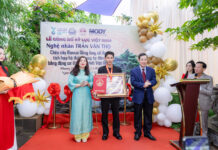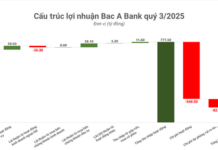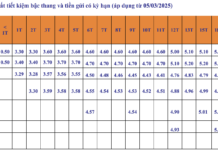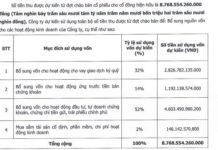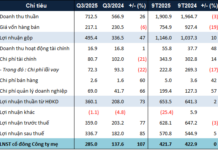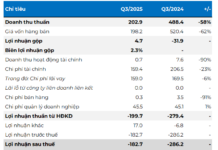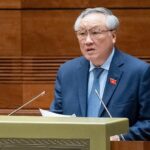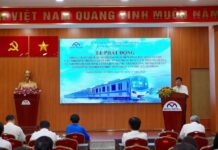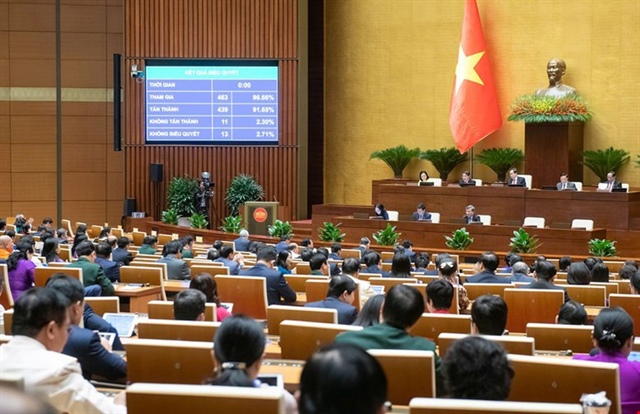
Chairman of the National Assembly’s Committee for Science, Technology and Environment Le Quang Huy presents the Report on the Explanation, Reception, and Amendment of the Draft Amended Law on Electricity |
Prior to the vote for adoption, Mr. Le Quang Huy, Chairman of the National Assembly’s Committee for Science, Technology and Environment, presented the Report on the Explanation, Reception, and Amendment of the Draft Amended Law on Electricity.
According to Mr. Huy, after being reviewed and amended, the draft law has been condensed from 130 articles to 81 articles (a reduction of 49 articles compared to the draft law submitted by the Government to the National Assembly at the 8th session; only 11 articles have been added compared to the current Law on Electricity).
Regarding the state’s policies on electricity development, particularly nuclear power development, the Standing Committee of the National Assembly (UBTVQH) believes that specific regulations on investing in and constructing nuclear power projects are already stipulated in the Law on Atomic Energy.
Therefore, taking into account the opinions of the National Assembly deputies and agreeing with the Government’s viewpoint, the draft law has been amended to only include general provisions on the planning of nuclear power development. Detailed regulations on nuclear power plants will be governed by the Law on Atomic Energy and other relevant laws, as stated in Clause 10, Article 5 of the draft law after the amendments.
In terms of electricity development in rural areas, ethnic minority regions, mountainous areas, border areas, islands, and regions with particularly difficult socio-economic conditions, the draft law has been amended to address the opinions of the National Assembly deputies. These amendments can be found in Clause 3 and Clause 13 of Article 5, and Article 17. They clarify the mobilization of investment capital for electricity development in these regions and the government’s support for electricity bills of poor households and those with social welfare policies.
Additionally, the development of renewable energy depends on renewable energy sources, natural conditions, and technical infrastructure. In cases where rural, mountainous, and island areas meet the necessary conditions, preferential mechanisms for investing in and constructing renewable energy projects will be applied in accordance with this Law.
With respect to the development of renewable energy and new types of energy, some National Assembly deputies suggested further reviewing and tightening the regulations to prevent violations that occurred in the past or the exploitation of policies, as well as the legalization of violations in renewable energy projects.
The UBTVQH stated that the Government has directed the main drafting agency to thoroughly review the entire draft law to ensure that its contents do not include or have any relation to renewable energy projects that are subject to inspection, investigation, or that legalize any violations.
Taking into account the opinions of the National Assembly deputies, the draft law has been amended and supplemented with numerous provisions in Chapter III on the development of renewable energy and new types of energy (from Article 20 to Article 29). These amendments aim to ensure transparency and efficiency in the management of renewable and new types of energy, while also authorizing the Government to stipulate the conditions and duration of application for preferential mechanisms and policies for these projects.
Regarding the development of offshore wind power, there is currently no unified definition or classification of offshore wind power in the world. The draft law includes two subjects for wind power projects in Vietnam’s sea areas: near-shore wind power projects and offshore wind power projects, as stated in Clause 5, Article 20.
Regulations on the roadmap for eliminating cross-subsidization in electricity prices
Concerning the elimination of cross-subsidization in electricity prices, the UBTVQH believes that gradually reducing and eventually eliminating cross-subsidization among customer groups and regions is necessary, in line with the spirit of Resolution No. 55-NQ/TW. Currently, retail electricity prices are uniformly applied nationwide, with cross-subsidization among regions.
Regarding cross-subsidization among customer groups, it is necessary to gradually reduce and eliminate it by constructing a retail electricity price structure that reflects the costs associated with electricity consumption patterns that affect the power system.
The implementation of reducing cross-subsidization depends on numerous factors (such as the progress of restructuring the electricity industry and the availability of feasible financial policies to implement the reduction in cross-subsidization). Therefore, it is essential to carefully and meticulously study and consider these factors to develop a specific roadmap. Including regulations to immediately eliminate cross-subsidization in electricity prices is impractical.
As a result, the draft law only stipulates the roadmap for eliminating cross-subsidization in electricity prices and assigns the Ministry of Industry and Trade to submit the roadmap for approval by the Prime Minister, in conjunction with the levels of development of the electricity market, as stated in Point d, Clause 2, Article 39, and Point c, Clause 3, Article 50.
Taking into account the opinions of the National Assembly deputies, the draft law stipulates that the winning bid price is the maximum electricity price for the buyer to negotiate with the winning investor. It authorizes the Government to detail the negotiation and conclusion of investment project contracts and power purchase agreements with the winning investor, based on ensuring the interests of the parties involved, as stated in Clause 2 and Point c, Clause 3, Article 19.
Regarding the electricity futures market, as this is a new issue that has not been practically tested in Vietnam, a thorough impact assessment is necessary before including it in the draft law. Therefore, the draft law only includes general principles and authorizes the Government to detail the regulations, as stated in Clause 6, Article 45.
If the Amended Law on Electricity is passed at the 8th session, it will contribute to accelerating the implementation of electricity projects and ensuring electricity supply security, especially in the context of the significant demand for electricity and the expected rapid increase in the coming time. It will also serve as a legal basis for the Government to direct ministries and sectors to actively and promptly build and perfect draft guiding documents for the Law’s implementation.
The Amended Power Law: Ushering in a New Era for Nuclear Energy
Nuclear energy projects offer a plethora of benefits to Vietnam, according to experts. These ventures present opportunities for high-quality employment and provide a gateway to access advanced technology from developed nations, fostering a boost in technical proficiency.
The Power of Nuclear Energy: Unlocking Vietnam’s Future with the Ninh Thuan Nuclear Power Project
On November 27, the government presented to the National Assembly a proposal to continue the investment policy for the Ninh Thuan nuclear power project. The government affirmed that the development of nuclear power must ensure the highest level of safety and minimize risks to people and the environment.
The Central Committee Unanimously Agrees to Restart the Ninh Thuan Nuclear Power Project
The Central Executive Committee has agreed on a strategy to restart the Ninh Thuan Nuclear Power Project and continue researching the Nuclear Power Program in Vietnam. This decision underscores the country’s commitment to exploring alternative energy sources and strengthening its energy security. With a focus on safety and sustainability, this project aims to pave the way for a more diverse and resilient energy landscape in Vietnam.



